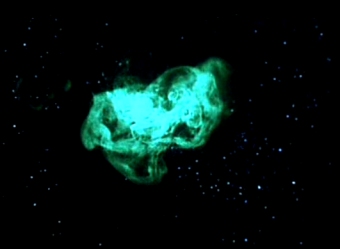|

In Star Trek, Murasaki 312 or Murasaki Effect is a
quasar-like electromagnetic phenomenon located in or near Federation
space. In 2267, it ionized an entire sector, including four solar
systems. Captain James T. Kirk of the USS Enterprise was under standing
orders to investigate formations similar to Murasaki 312, consequently
delaying the Enterprise from a medical supply mission to Makus III, and
sending the shuttlecraft Galileo to survey the formation. (TOS: "The
Galileo Seven"). In 2367, around stardate 44390,1, the USS Enterprise-D
conducted a long-range sensor scan of the Murasaki Quasar. (TNG:
"Data's Day")
A Quasar (QUASi-stellAR radio source) is an extremely
powerful and distant active galactic nucleus. While there was initially
some controversy over the nature of these objects, there is now a
scientific consensus that a quasar is a compact region surrounding the
central supermassive black hole of a galaxy. A quasar consists of a
black hole surrounded by super-heated gas that gives off prodigious
amounts of radiation - sometimes a billion times the mass of our own
Sun. Quasars begin life as distant galaxies, and eventually they
collapse, and the galaxy and gas is swallowed by the black hole.
Thought to number about 100,000 in total, they are among
the most mysterious, distant and significant objects in the universe.
First discovered in the 1950s, they are scenes of cataclysmic violence.
They are also the most distant objects we have ever seen. When the
universe was young, quasars were common, but due to the extraordinary
distances involved, and the time their light takes to reach us, we can
still see them, burning bright.
|
|
